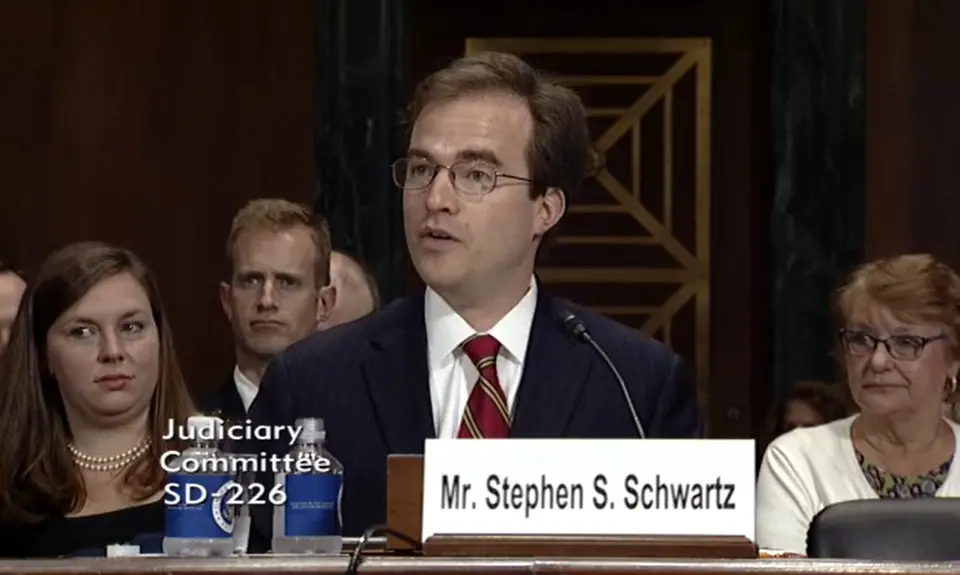On June 7, 2017, President Trump nominated Stephen Schwartz to be a judge on the U.S. Court of Federal Claims. While that nomination never got a final vote, Schwartz was nominated to fill a different vacancy on the same court on October 17, 2019. The Senate Judiciary Committee has scheduled his committee vote for March 5. People For the American Way wrote to senators to express our opposition to the Schwartz nomination. You can download our letter here.
Dear Chairman Graham, Ranking Member Feinstein, and Committee Members:
On behalf of our 1.5 million supporters nationwide, People For the American Way strongly opposes the nomination of Stephen S. Schwartz to the Court of Federal Claims. When he was first nominated to this court in 2017, it was clear that he was not qualified. Recently uncovered writings that he had failed at that time to disclose confirm that his goal is to use the courts to undo the New Deal and eliminate the nation’s social safety net.
Reflecting his pre-New Deal view of the law, Schwartz wrote that:
Much of what the federal government does now is without constitutional basis in the first place. One can find constitutional provision for departments of defense, justice, state, commerce, and the treasury without difficulty. But transportation? Education? Agriculture? Such departments, under the Tenth Amendment, oversee matters that often ought to receive government attention but are reserved for state authority.i
His cramped view of the constitutional authority of Congress would take our country a century backward. We would no longer be able to adopt vital health and safety protections that have saved countless lives across the nation and prevented many abuses of power that large corporations would otherwise be able to commit against individuals.
Schwartz’s writings about the social safety net reflect his extremely narrow view of appropriate subjects of congressional action. He has condemned Social Security, Medicare, Medicaid, and other vital programs as “well beyond the limits of reasonable altruism.” He wrote:
But while saving the elderly [from starvation] may be a worthwhile goal for the government to take, the modern aim of guaranteeing them a comfortable, modern standard of living and full medical coverage is not.ii
In the same article, he wrote:
There is a powerful case to be made that all government spending on Social Security, welfare, medical insurance, and the like is harmful not only to society as a whole but also to the ostensible beneficiaries of such programs… [P]eople who come to depend on an outside agent (be it a patron, government, or parent) for their livelihoods are inevitably somewhat less than fully mature adults.iii
Schwartz also condemned such federal programs for replacing charity provided at the whims of the wealthy:
Government guarantees also erode the impulse to donate to charity. Americans are naturally generous, but the vital spirit of personal kindness can only be undermined when individuals with the means to give are allowed to believe that the government is performing their duties for them.iv
This is the Lochner era view of a government-provided safety net. The nominee’s writings resemble those of the Depression-era justices who dissented from the Supreme Court’s upholding of Social Security. For instance, Justice McReynolds condemned the idea that the federal government can:
assume all that duty of either public philanthropy or public necessity to the dependent, the orphan, the sick, or the needy which is now discharged by the States themselves or by corporate institutions or private endowments existing under the legislation of the States. The whole field of public beneficence is thrown open to the care and culture of the Federal Government. … [The] constitutionality and propriety of the Federal Government [does not include] providing for the care and support of all those among the people of the United States who by any form of calamity become fit objects of public philanthropy.v
Even before the latest revelations, we knew that Schwartz had chosen a career advancing high-profile right-wing causes. He has:
- defended legislation in Louisiana that places substantial burdens on women’s ability to exercise their right to have an abortion;
- argued that Title IX does not prohibit discrimination against transgender students;
- defended North Carolina’s notorious anti-transgender HB2 (the “bathroom ban bill”);
- represented North Carolina in litigation over its major voter suppression law (which the Fourth Circuit struck down, finding it “target[ed] African Americans with almost surgical precision”);
- argued that President Obama’s 2012 DACA program was not lawful and that states could therefore legally deny driver’s licenses to Dreamers covered by the program.
This record makes clear why he was selected for a judgeship. The circumstances of his 2017 nomination made him suspect even then. In 2015-2016, five highly qualified jurists who had been approved by unanimous voice vote by the Judiciary Committee needlessly had their nominations to this court languish for the entirety of the 114th Congress under the Republican majority. Just as they did with the Supreme Court, Senate Republicans chose to leave those vacancies unfilled in the hopes of winning the 2016 election and filling them with people who they could rely on to rule in the interests of their party and their corporate donors. With Trump taking office, the five qualified Obama nominees were tossed aside for movement lawyers like Stephen Schwartz.
His nomination very much seems to be based on an expectation by his supporters that he would let his conservative political ideology shape his judicial opinions and rule in ways that put the rights of the powerful ahead of the rights of all people. We urge senators to oppose confirmation.
Sincerely,
Marge Baker
Executive Vice President for Policy and Program
